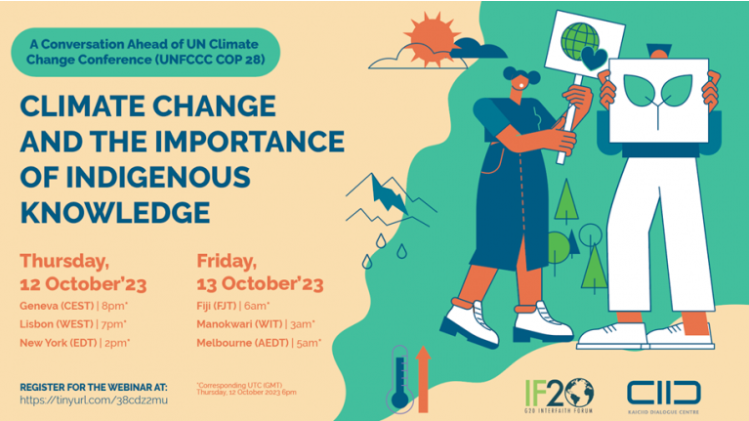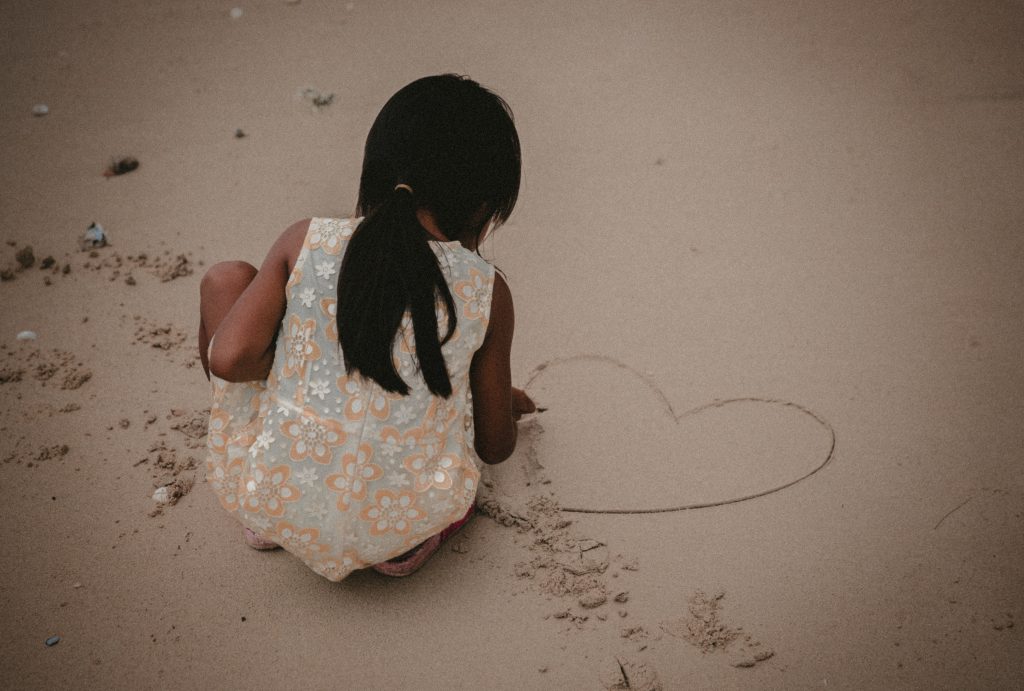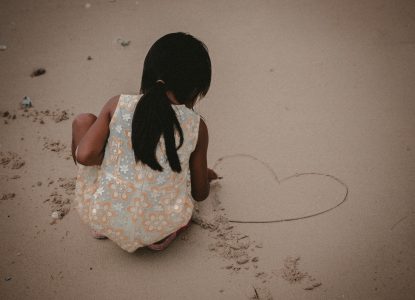By Arthur Lyon Dahl – International Environment Forum, IF20 Environment Working Group.
– – –
On October 12th, 2023, the G20 Interfaith Forum’s Environment Working Group, in cooperation with KAICIID, held a webinar entitled “Climate Change and the Importance of Indigenous Knowledge.”
Speakers included Dr. Nicole Redvers, a member of the Deninu K’ue First Nation (Northwest Territories, Canada) and Associate Professor, Western Research Chair, and Director of Indigenous Planetary Health at the Schulich School of Medicine & Dentistry at Western University; Tafue M Lusama, Climate Change Project Officer for the climate change unit of the Pacific Theological College in Suva, Fiji, where he also heads the Institute for Climate Indigenous Knowledge (ICIK) within PTC; Elvira Rumkabu, lecturer of international relations at Cenderawasih University in Jayapura, Papua; and Dr. George Carter, Professor at Australia National University exploring multilateral climate change negotiations, regionalism, climate security, climate knowledge and education, foreign policymaking and geopolitical security interests, Oceania diplomacy and Pacific diaspora politics. Arthur Lyon Dahl, President of the International Environment Forum and a retired senior official of the United Nations Environment Programme, moderated the discussion.
This webinar explored how certain Indigenous/native communities – in the Pacific, as examples – see the well-being and sustainability of the Earth. It highlighted diverse climate sciences that were developed by these communities and examined how this knowledge and spiritualities could complement reports from the scientific community such as the Intergovernmental Panel on Climate Change (IPCC). The webinar showcased how climate Indigenous/native knowledge can help produce community-based ecological curricula and transform educational spaces and offerings; and how, ultimately, we can actively participate in building sustainable, resilient, and just communities.

Introduction by the Moderator (Arthur Dahl)
Anyone who follows the news about the climate change conference COP28 knows that climate change is hitting everywhere, with more powerful cyclonic storms, heat waves and forest fires, droughts and floods, crop failures and rising sea levels, all stronger and sooner than climate science had predicted. We are already seeing major human impacts, loss and damage, at only 1.1°C of global temperature increase, and may soon go over the 1.5°C danger point agreed in Paris. The mean ocean surface temperature has surged an unprecedented 0.7°C this year, threatening a massive collapse of coral reef ecosystems. Scientists are warning that humid tropical areas may become uninhabitable.
Having lived 11 years in the Pacific Islands as their environmental advisor, I have been warning of these environmental threats for 50 years. Climate justice is not some theoretical issue when atoll countries risk losing their entire national territory and their citizens becoming stateless migrants.
The Indigenous world-views and spiritualities of island peoples saw the ocean, land, air and people as a whole integrated system, from their ancestral roots to the respect owed to their local resources. I saw how Indigenous science based on generations of close observation and transmission of wisdom from the ancestors was in many ways far ahead of Western science, and enabled communities to survive and prosper in their limited and highly variable island environments. We need to bring together this traditional science with Western science as complementary ways to understand our world.
Today the climate crisis and associated sea level rise and ocean acidification represent a whole new level of risk for island States and communities. Cyclones and other extreme events are increasing, coastlines are eroding, coastal areas are flooding contaminating freshwater resources, coral reefs are degrading and fish are disappearing or becoming poisonous.
We need to consider these risks at multiple levels.
How can island and other Indigenous communities adapt to these challenges? Can traditional solidarity and resilience face up to these threats? What about the young generations caught between tradition and modernity, especially the consumer economy? What hope can they have in the future, and how can they best prepare?
At the national level, how do you face the future with realism while preserving the uniqueness that you have inherited from your ancestors? Tuvalu is loading its language and culture into the cloud as the only place safe from rising seas. Where can displaced people go?
Internationally, the fight for climate justice and for reparations for loss and damage is far from over. Small Island Developing States (or large ocean states) have already made their mark and won some battles, as the Marshall Islands did at the Paris Climate Conference. One big challenge is the lack of any global legal protection for climate-displaced persons like the Refugee Convention for those who are persecuted. There should be provisions for communities, and even whole nations, to change their physical location while preserving their language, culture and social relationships. A drowned island state should retain its rights to its ocean resources and Exclusive Economic Zone, which is not legally possible today.
The speakers were invited to explore some of the following issues:
• How do Indigenous communities see the well-being and sustainability of the Earth? What diverse climate sciences were developed by these communities? How can this knowledge and Indigenous spiritualities complement reports from the mainstream scientific community?
• How can climate Indigenous knowledge help to produce community-based ecological curricula and transform education?
• How, ultimately, can we all actively participate in building sustainable, resilient, and just communities?
Indigenous knowledge, cultures and spiritualities are too important to their owners, and to the new world of unity in diversity that must evolve, to be lost to neglect. With inevitable migrations, how do we prepare receiving communities to welcome this diversity and not push back? What might be the role of faith communities in responding positively to these challenges?
Western science is too materialistic and ignores broader world-views and any higher human purpose and spirituality. I know this is a central concern of the Baha’is. Our wonderful speakers will share some initial thoughts, and then we can have a rich and constructive consultation with reflections to take back to all our communities.

Initial Presentations
Nicole Redvers
Nicole Redvers, a member of the Deninu K’ue First Nation Canada and Director Indigenous Planetary Health, Western University, Ontario, described the Earth-centred world-view and intergenerational perspective of the First Nations of northern Canada. At the centre are Natural or First Laws. From these is derived Indigenous traditional knowledge, which can generate applications for planetary health, resulting in healthy communities and ecosystems. This acknowledges what science has shown are interconnected ecosystems at multiple scales, and contributes to the determinants of planetary health. Humans are nature; there is unity between natural laws and us, producing an ecologically-bound identity.
George Carter
George Carter, originally from Samoa, a Professor at Australian National University specialising in climate change, loss and damage, spoke from Samoa, where he was meeting to prepare Pacific Island inputs to COP28. There is an effort to raise the profile of Indigenous knowledge in UNFCCC negotiations [unlike the Convention on Biological Diversity where it is fully incorporated]. Pacific Island countries need more support to draw on Indigenous knowledge in mitigation and adaptation, reflecting climate justice.
One specific project is to improve weather monitoring, integrating meteorology and Indigenous practices in communities. Agriculture is another challenge, with imported rice now the convenient staple, while bringing back Indigenous crops like taro will bring back food security because it is locally grown, if issues like drought resistance and protection from salt water intrusion can be addressed. Managing water resources also needs more support. Island countries need to scale up their efforts at the UNFCCC to mainstream Indigenous peoples in the response to loss and damage, the global stocktake and the just transitions work programme.
Tafue Lusama
Reverend Tafue Lusama, theologian from Tuvalu and head of the Institute for Climate Indigenous Knowledge at the Pacific Theological College, Fiji, has always been a climate activist. His college is transforming into a Pacific Communities University next year based on a whole-of-life vision. They want to go beyond foreign frameworks and the impact of missionaries from outside, and away from extractive research that fails to acknowledge traditional owners. Accumulated wisdom includes open, closed and sacred knowledge. The new curriculum is based on extensive consultation in the villages, combining ecological knowledge, faith and spiritualities. The key theme is relationality, the interconnectedness of all things.
The UNFCCC has only had two binding agreements, Kyoto and Paris, but the resulting imported forms of climate adaptation without local Indigenous knowledge, like building seawalls, have largely failed because there was no link to spirituality and no sense of local ownership.
Elvira Rumkabu
Elvira Rumkabu, Lecturer in International Relations at Cenderawasih University based in Jayapura, Papua, Indonesia, described the reality of Indigenous communities in conflict with the Indonesian government and its development priorities and exploitation of natural resources. They have studied Aiwat village, 300 people, with no local facilities like a school or health centre, while big corporations take their land for oil palm plantations. They are subject to racism and marginalisation. They are impacted by climate change, and the river, their only water supply, has been polluted by development. They watch big ships go by, and have nothing.
There are many layers of traditional identity: women, men, young people, elders. Traditional knowledge changes. It is hard to keep its strength when your land is taken. Climate change is not understood; it is too abstract. It needs to be connected to their lives, in ways that can be religious or customary. The people raise red crosses as symbols of resistance and justice.
Discussion and Q&A
The Moderator thanked the speakers for their enlightening initial presentations, and moved to a conversation between the panelists while addressing questions from the audience. To start the discussion, he raised some initial questions:
• How can Indigenous knowledge and spiritualities reinforce community resilience in the face of climate change impacts?
• What can we do to preserve and transmit Indigenous knowledge and spiritualities in communities uprooted by climate change?
• How can we help the youth to retain their unique Indigenous spiritualities in a changing world?
• For the Pacific Islands in particular:
• Can islanders take the lead in combining and showing coherence between Indigenous climate knowledge and global climate science?
• What messages for climate justice should Pacific Island countries take to COP28?
• Should we call for an international convention on justice and rights for climate-displaced peoples, including protecting their collective interests?
• For those islanders facing forced displacement as the sea level rises, can Indigenous and faith communities reinforce solidarity with those in need?
Nicole Redvers: Indigenous knowledge is increasingly recognised, but it is not a single abstract concept. It combines knowledge, people and their land as a whole, and there are a diversity of knowledges. It cannot be scaled up because it is place-based, in a localised holistic way of seeing the world.
George Carter: Pacific Island countries need help with mobility as people are displaced, requiring dialogue with those affected, and cultural sensitivity and spirituality. Vanuatu and Fiji are already having to displace communities, but when moving a village, it is not easy to relocate cultural practices associated with a specific place. There is a loss of community cohesion.
Reverend Tafue Lusama: Global science is not understood because it is not contextually-based and situational. There is no one solution. Young people have been disconnected from Indigenous culture by their education in urban centres and in their employment, beyond the life in their original communities. The college has started programmes to re-educate them in traditional knowledge by their elders.
Elvira Rumkabu: The government allows big corporations to do anything in support of the national development strategy, with no consultation with local people, demonstrating racism. The military are used to oppress Indigenous people, with ongoing conflict. It is an intergenerational problem.
At the end of 90 minutes of rich exchanges, it was agreed that the webinar had only touched the surface of important issues, and further dialogue was needed to explore in more depth how Indigenous knowledge can be preserved and drawn upon in the face of climate change and other development pressures.
– – –
Arthur Lyon Dahl is President of the International Environment Forum, and a retired Deputy Assistant Executive Director of the United Nations Environment Programme (UNEP), with 50 years’ international experience in environment and sustainability. His most recent focus has been on global governance and UN reform.


